Daniel Craig Defiance Interview
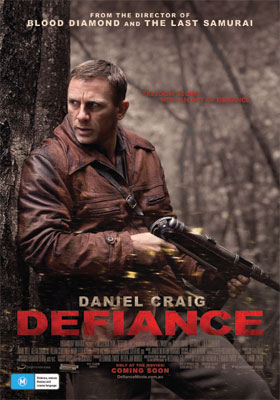
Daniel Craig Defiant
Daniel Craig, Defiance Interview by Paul Fischer.British heartthrob Daniel Craig may now be known as 007, but he is as accomplished an actor on stage or screen as exists in Britain. Following on the heels of the critically mixed Quantum of Solace, Daniel Craig returns to the screen in Defiance, the true story of three Jewish brothers who escape from Nazi-occupied Poland into the Belarussian forest, where they join Russian resistance fighters and endeavor to build a village in order to protect themselves and others in danger. In this interview, Craig talks about the film, its issues, relevance to contemporary audiences and his reaction to the reception of the latest Bond film. He talked to Paul Fischer.
Paul Fischer: Last time I saw you, you were wearing a Question: You've played a Mossad agent and now this role. Does that give you some insight into the Jewish experience and are you converting?
Daniel Craig: No. No, I'm not. Does it give me an insight into the Jewish experience? I suppose that it does, but religion was not a factor in taking this job. It was just literally one of those situations that I sort of looked at, read it and thought that it was an amazing story.
Paul Fischer: Was it the story or the character?
Daniel Craig: Both. I mean, the character is in just a dreadful, dreadful, dreadful situation. There's no going away from it. God forbid any of us should be put into that situation, but something is asked of him and he's very reluctant to do it and I love the fact that they're sort of saying, 'No, you must do this.' He's going, 'No. Fuck off. I mean, I want to protect my brothers and I want to look after what's left of my family and I want to run away.' And they were saying, 'But you don't have a choice here.' I think that process and obviously we condense it in the film and this is over a three or four year period, we condense the whole thing in the film but it's incredible.
Paul Fischer: Did you have a period of self-analysis once you saw the story and thought about how you would've handled the situation?
Daniel Craig: Completely. I think that hopefully is one of the questions that people ask themselves when they're coming out of the film, but I don't know.
Paul Fischer: How you would've reacted?
Daniel Craig: I mean, it's unimaginable what those people went through. Obviously you'd like to think that you'd do the right thing.
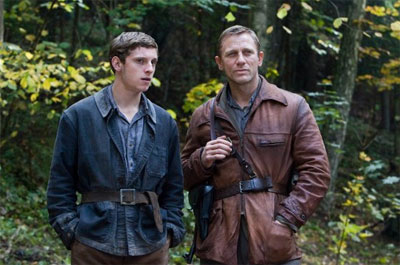 Paul Fischer: Does physical geography help you define the way you play a character like this, the fact that you working in that environment in the forest in that weather? According to various sources the trailers were a half mile away.
Paul Fischer: Does physical geography help you define the way you play a character like this, the fact that you working in that environment in the forest in that weather? According to various sources the trailers were a half mile away. Daniel Craig: It was a quarter mile yesterday and it's gotten up to several miles today. It'll be sixteen miles away by the end of the day. We didn't have a trailer. We had a bucket and a tarpaulin and I was happy with it. Yes, of course it does. It has a huge influence on what you're doing and it did have an influence on us, the fact that we all decided that we'd rather not spend time in our trailers, that we'd rather spend the time on set. I think that's key to a lot of what went on there on the set. It was cold. It was miserable. It was wet. It was uncomfortable, but you always have in the back of your mind the idea that you have a bed to go back home to that night and that there is some hot food somewhere within the forest. You're prepared to go looking for it at some point. These people did three winters there and that's just mind blowing.
Paul Fischer: People have said that they were surprised that such a big movie star like you didn't go back to your trailer. You don't strike me as being a big movie star type person.
Daniel Craig: I don't strike you as being a big movie star? Thanks. [laughs] This is going well. I don't spend much time in my trailer anyway even if it's huge and it never is. The last place that I want to be is in a smelly caravan. I mean, I'd rather be on set trying to get some work done.
Paul Fischer: Did you read the Beilski story and meet their family? What did you do when you met them?
Daniel Craig: We did, yes. We sat and we drank and we talked and we had a conversation and we didn't talk much about Tuvia, but we sort of talked about... I just wanted to get a feel for them really. They were just sort of incredibly forward people, really energetic and really full of life and a proper family. They're like families are, sitting there and shouting at each other. Why whisper when you can scream. They're kind of like all families are and they're full of life. I mean, both Liev and I said, 'These guys are kind of scary guys.' They were like, 'Hey! Come on!' I can imagine that that's how their parents were, their father was.
Paul Fischer: It seems there was more brutality in the real brothers' experience than was in the movie. Was it out of respect for the family that that wasn't shown?
Daniel Craig: It's not at all that, I think. I think we tried to be as straight as possible. The events that take place in the movie happened. They happened in different ways. They happened in different contexts, but they actually kind of all occurred. This film takes over a year to happen roughly speaking and we've condensed a huge amount into that period, but we haven't shied away from anything. It's known and it's fact that they had to survive and in order to survive they had to do bad things. It's documented and it's there.
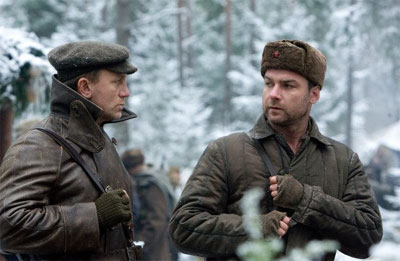 Paul Fischer: Tuvia had to do the martial law thing when his leadership was threatened. Can you talk about finding that part of the character, him being very tough on those people?
Paul Fischer: Tuvia had to do the martial law thing when his leadership was threatened. Can you talk about finding that part of the character, him being very tough on those people?Daniel Craig: He was. Again, it was clear if you read about it that there were power struggles and there were very serious power struggles. You can judge it if you like. One could judge it and ask if it's just because he wanted to remain in power or if he was just trying to keep it together. It's probably a little bit of both. It was just a completely extreme situation, and again, the question that you ask yourself is what would I do. Would I for the greater good of the group take this person out and quell this dissension aggressively and violently or do I leave it alone and allow the whole thing to just sort of disintegrate.
Paul Fischer: How physically demanding was this film given that you like to do all your own stunts?
Daniel Craig: I mean, obviously there aren't the same amount of stunts as in the 'Bond' film, but it was physically demanding because we were literally filming on slopes like this in wet, cold weather all day long. We had a crew of grips that were running around with track and putting them at all sorts of angles. I mean, we were all physically running and up and down these hills day.
Paul Fischer: You're going after tanks and stuff in the film too though.
Daniel Craig: It was lying down, shooting at them. I wasn't really going after them. That was Liev. He did that.
Paul Fischer: The reaction to this latest 'Bond' film was very different than the reaction to 'Casino Royale'. Did that surprise you?
Daniel Craig: No, because 'Casino Royale' was based on a novel and we're always going to have that. When you do a movie like that where the basis of a story is really strong and also the momentum of it, everyone thought that it was going to be shit. So when it wasn't they were all just completely surprised. I think that 'Quantum of Solace' is as good a movie as 'Casino Royale'. I think that the difference is that last time people were surprised by the fact that they enjoyed it. The fact is that we get reviews in newspapers that we'd never had reviews in before. Certainly with the internet we get seven and a half million reviews which are all worth looking at obviously.
Paul Fischer: The financial success of the film though must suggest that people really respond to you as Bond.
Daniel Craig: I don't try to intellectualize that. I do know what we've done is make a movie that the first time I saw it I got a huge kick out of it. Ultimately that's what we're trying to do at the end of the day, putting a movie out that's an entertaining, exciting, hopefully slightly moving 'Bond' movie. That's all our goal ever was. The way that people have taken to it is just amazing.
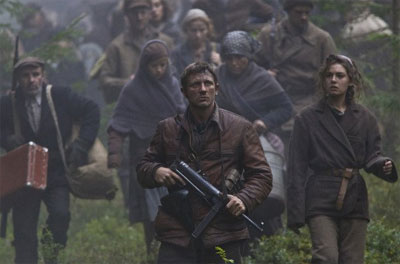 Paul Fischer: Do you think that calls for the next one come a little quicker after this opening weekend?
Paul Fischer: Do you think that calls for the next one come a little quicker after this opening weekend?Daniel Craig: I haven't heard anything, but then I'm not answering my phone.
Paul Fischer: What more do you want to do with Bond, what other parts of him would you like to explore?
Daniel Craig: Well, I genuinely think we've got a blank page now. We've finished this story off. 'Quantum of Solace' was exactly the right thing to do. We started something with 'Casino Royale' and we wrapped it all up with 'Quantum of Solace'. We're ready to begin again and we can do what we want.
Paul Fischer: So you think that it'll be a throw back?
Daniel Craig: Submarine space and outer space.
Paul Fischer: Are you still looking at Ian Fleming story elements because that worked so well in 'Casino Royale'?
Daniel Craig: Yeah, but there's nothing left. It's all done unless someone finds a dirty manuscript under the couch, we're stuffed.
Paul Fischer: What about the Gardner books?
Daniel Craig: I've never read them. I would bet any money that someone sort of optioned them and that they're tied up in something else. It's a very closed box.
Paul Fischer: How was doing the language work in this film that you had to do?
Daniel Craig: It was a nightmare for me. I'm just the worst student in the world. I left school at sixteen. I literally cannot conjugate a verb in English. You can't conjugate a verb in English, can you? So, God knows what I know. So that's it. I really did screw up there because I actually don't really know what a verb is. Liev has years of education ahead of me and took to this very well and learned the language a little. I had to do it phonetically, learn it and understand it. I understood what I was saying, but Russian is a tricky language to get far with. It's quite easy to sort of communicate in Russian, but to actually sort of speak the language is hard.
Paul Fischer: Did Liev make fun of you for it?
Daniel Craig: He tried to [laughs].
Paul Fischer: Do you have to have a mastery of languages to be an actor?
Daniel Craig: No. I think that you have to have an ear. I mean, part of acting is sort of mimicry, but I don't like acting as mimicry. I don't think that mimicry is very interesting in acting. I think that you have to have an ear. I've tried to learn languages and I know there's a certain stage that you get to where you have to make that sort of leap of faith and go, 'Okay, I know how to put this accent through my mouth.' It's a really hard process to go through. As an actor you have to try and make that leap because you're trying to communicate and communication is the name of the game. If you're not doing that you're kind of failing.
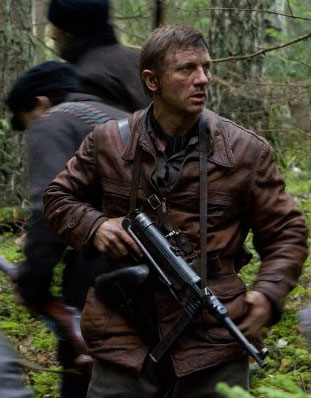 Paul Fischer: Is it important for you to do projects other than 'Bond' between the films?
Paul Fischer: Is it important for you to do projects other than 'Bond' between the films?Daniel Craig: It's not really the method that I go by. Look, I'm not going to take another part as a British spy who drives nice cars. That's definitely not going to happen, but I'm not closing the door on anything.
Paul Fischer: What kind of things ideally would you like to do?
Daniel Craig: I'm keeping a very open mind about it.
Paul Fischer: So there's nothing else on the horizon about it?
Daniel Craig: Not for the moment. A holiday.
Paul Fischer: How will you be spending the holidays?
Daniel Craig: Happily, hopefully [laughs]. Very quietly.
Paul Fischer: How shocking was the revelation that the Jews fought back? Have you seen people reacting to that notion?
Daniel Craig: Well, I knew about it a little bit. I knew that there was a Jewish resistance, but the only things that I've read about it is that it was wiped out mercilessly. It makes complete sense. Of course they did. The fact that nobody did would've been totally strange, but there were major pockets of resistance everywhere. People did fight. The fact is that there was really nowhere to run. The situation here is that the resistance happened within places like this where there was a forest, where people could get away from them. The local population was in cahoots. Unless you could get on a boat and get out of Europe you were absolutely stuck. This was an incredibly well organized exercise by the Germans. I mean, they did it really efficiently as we all know. I think that our knowledge of the second world war is based on, and so it should be, what the result of The Holocaust was. Those are the images and the knowledge that we have of that period as we should and we should be reminded of it as often as we possibly can.
Paul Fischer: Why do you think that The Holocaust remains so cinematically timely?
Daniel Craig: Well, that's a sort of weird question. I mean, I don't know if it's a question of whether it does. It just should.
Paul Fischer: It should remain so?
Daniel Craig: Yeah. There was an article in 'The New York Times' that said world war two movies have become genre movies and I can't argue with that. Every movie in a sense is a genre movie, but a genre movie suggests that we were cynically sort of going out to make money with this project. That was never the object. This is recent history and especially if you're in places like Lithuania or even if you're in France or parts of France or parts of Germany or parts of Holland - this is recent history. It still has a huge effect on the way that Europe is shaping itself. You only have to look at Bosnia and Croatia and what happened there. What happened in the second world war was used to inflame that situation and it's still there. Those hatreds still lie very, in some places, close to the surface, just below it. The treaties that were put into place after the second world war to stop it from happening again have all been fucking walked over steadily every year since.
Paul Fischer: Especially in the last eight years.
Daniel Craig: I think every year since. I mean, obviously the last eight years haven't helped, but the human rights treaties and the laws about genocide and trying people in the international courts, they tried and haven't succeeded. That's why stories like this have resonance still. But also with this story it's about surviving and how you survive with your humanity intact as opposed to coming out the other end a monster.
Paul Fischer: Being a father, some of those paternal notions would probably show up in a role like this. Do you imagine when you do something like this protecting your own offspring?
Daniel Craig: Well, in that situation I keep my family out of my work. I'd never use them for that reason. I think it's a sort of weird notion. Of course that's your instinct. Your instinct is, 'I would protect this tooth and nail.' But that's the thing, isn't it? That's what was so dreadful about this happening and any other circumstance like this happening in recent times. The notion in this is that family matters more than anything else and that's what keeps you together, but obviously we throw into that this brotherly relationship where the two of them kind of hate each other and the fact is that they can't live with each other. It's more complicated and the more complicated it is hopefully the more interesting it becomes. Of course there's the paternal instinct to sort of look after people, but there's just as strong an instinct to be looked after and it's a reciprocal thing. You help someone and the idea is that they'll help you back. It's all of those things, paternally, brotherly, sisterly.
Paul Fischer: Culturally we mourned those who were lost during that period. Have we not celebrated those who survived enough?
Daniel Craig: I think there's an element of that. I think there's an element to the fact that stories like this represent that. For me this is an allegory for the modern life or parts of the modern life for parts of the modern world. When do we stop fighting? When do actually decided to stop fighting so that we can live and despite the fact that there's this society that Tuvia had to kind of build up with a very authoritarian manner, and had to be because of the circumstances, the decision not to go to war and start living and start living as human beings, when do we actually make that switch and go, 'Can we stop this now and get on with life?' It's a debate because obviously these men fought and they fought for their lives. But they fought to sort of get back to normal. That just rings true with me.
Paul Fischer: Did you hear any stories about Tuvia's adjustment after all of this?
Daniel Craig: He found it very difficult. He went to Israel. I think that he fought in The Six Day War. He was given a commission, I think, and made an officer and didn't really succeed. Then he came to New York with the family and they started a cab firm in New York and forgot about it, left it. But that's a testament to them as much as anything. The fact is that in spite of the horrific things that they went through they managed to live a life of peace afterwards and kind of forgot it and lived a life. It must've been tremendously difficult. I'm sure that he got very little sleep.
Paul Fischer: Where does your egoless attitude come from?
Daniel Craig: Listen, you're absolutely determined to make me egoless. I'm certainly not. I'm a nightmare on set. I just paid them all off. It's just the way that I like to work. You're asking me a question about my ego which is embarrassing to answer. The way that I like to work is with people. If you separate yourself from the work in process then there's no connection. Otherwise why go to work.
Paul Fischer: What are your hopes for the New Year?
Daniel Craig: I can't answer questions like that without it sounding like a stock answer. Obviously I want world peace. What can I tell you? For myself I want health for my family. I want health for my friends. I'd like to continue what I'm doing. It's what everybody wants really.
Paul Fischer: Do you want to go back to the theater?
Daniel Craig: Yes, I'd love to.
Paul Fischer: Are you looking for something to do?
Daniel Craig: I'm not looking for something, as it were. I mean, if something comes along.
Paul Fischer: Is there a classic role you'd like to do?
Daniel Craig: No. Too many lines. Too many words.
Paul Fischer: Is there something about your level of fame now that you truly enjoy and something you truly despise?
Daniel Craig: My privacy is obviously the thing that gets invaded. I weigh it all out.
Defiance
Starring: Daniel Craig, Liev Schreiber, Jamie Bell, Alexa Davalos, Allan Corduner, Mark FeuersteinDirector: Edward Zwick
Rated: R [See Full Rating] for violence and language
Genre: Action/Adventure
Based on an extraordinary true story, DEFIANCE is an epic tale of family, honor, vengeance and salvation in World War II. The year is 1941 and the Jews of Eastern Europe are being massacred by the thousands. Managing to escape certain death,... Based on an extraordinary true story, DEFIANCE is an epic tale of family, honor, vengeance and salvation in World War II. The year is 1941 and the Jews of Eastern Europe are being massacred by the thousands. Managing to escape certain death, three brothers take refuge in the dense surrounding woods they have known since childhood. There they begin their desperate battle against the Nazis. Daniel Craig, Liev Schreiber and Jamie Bell star as brothers who turn a primitive struggle to survive into something far more consequential - a way to avenge the deaths of their loved ones by saving thousands of others. At first it is all they can do to stay alive. But gradually, as whispers of their daring spreads, they begin to attract others - men and women, young and old - willing to risk everything for the sake of even a moment?s freedom. Tuvia (CRAIG) is a reluctant leader and his decisions are challenged by his brother, Zus (SCHREIBER) who worries that Tuvia?s idealistic plans will doom them all. Asael (BELL) is the youngest - caught between his brothers? fierce rivalry. As a brutal winter descends, they work to create a community, and to keep faith alive when all humanity appeared to be lost.
MORE





